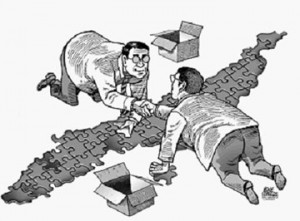
Graphic images of storm damage fill TV reports and social media. The damage brought by these disasters do have a lingering impact.
In fact, rehabilitation work for 2009 Ondoy damage is still ongoing. Then came this widespread flood caused again by abnormal monsoon rains enhanced by tropical storm Haikui, which doesn’t even have a local name yet because it hasn’t entered Philippine territory en route to China. It has dumped more rain than the 2009 Ondoy.
Disasters are costly. They eat up whatever savings are made in the economy and sets back whatever economic growth is achieved.
The general area hit by Ondoy and now affected by Haikui and the habagat contribute about 60 percent of the country’s gross domestic product (GDP).
Economists are now saying the impact of the recent floods will erode the record-setting 6.4 percent GDP growth of the first quarter of 2012.
Here in Cebu, the supply chain of goods and raw materials for the manufacturing industry is sure to be disrupted by this latest calamity.
Cebuanos have joined national efforts to mobilize humanitarian aid to the flood victims in Metro Manila who reach close to one million.
The urgency of the suffering makes this a cause that should be supported by all.
There are other things Cebuanos can do in the short term and medium term.
As the second biggest metropolis, Cebu can serve as the alternative location for businesses dislocated by the storms.
This shouldn’t be misconstrued as opportunism but rather affirmative action to make the country’s economy better prepared for the new normal Secretary Paje was talking about.
Some things have to be put in place such as better harmony between the Capitol, highly urbanized cities, component cities and municipalities.
Coordination for a genuine Metro Cebu or Mega Cebu is certainly a good starting point. Integration may be the operational word if Cebu has to take a bigger role in nation building or just weathering the next national calamity.
A high level of collaboration needs sincerity and mutual help to mount a Metro Cebu traffic system, integrated tourism development plan, public infrastructure master plan and an integrated disaster risk reduction management plan.
Cebu has to think and act with a more noble sense of unity.
Now if only its political leaders can set aside parochial or ego-driven decisions to behave with more statesmanship.
Who else is in the best position to offer a safe, dry haven for investments and get the Philippine economy on steady ground?